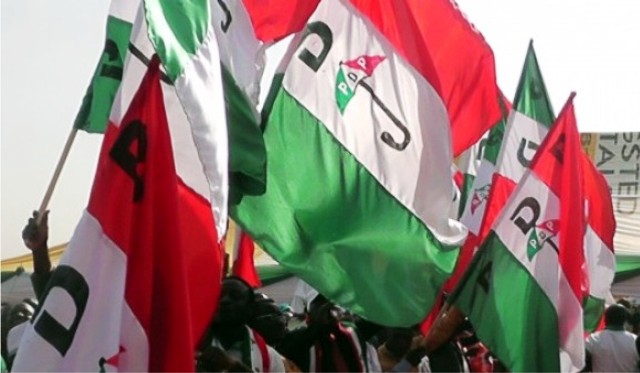Editorial
Return Of PDP

Nigeria’s political space was once again enlivened last week as the nation’s judiciary saved the acclaimed Africa’s largest political party, the Peoples Democratic Party (PDP) from itself.
Last Wednesday precisely, the Supreme Court of Nigeria ended the 14-month leadership squabble within the PDP, giving it a new lease of life ahead of the all-important 2019 general elections.
Former Kaduna State Governor and PDP’s National Caretaker Committee Chairman, Senator Ahmed Makarfi and erstwhile Borno State Governor, Senator Ali Modu Sheriff had been locked in a protracted legal battle for the soul of the main opposition party, forcing it to lose critical elections, including governorship seats in Edo and Ondo States and legislative seats in many others.
Not only that, the PDP has been grappling with loss of high-profile membership to the ruling All Progressives Congress (APC), especially at the national level, after it suffered an embarrassing defeat in the 2015 presidential election.
But in what seems to be a reinvigorating tonic for the PDP, a five-man panel of the apex court led by the Chief Justice of Nigeria (CJN), Justice Walter Onnoghen, Wednesday removed the Ali Modu Sheriff faction of the party and affirmed the leadership of Ahmed Makarfi which was earlier sacked by the Federal Court of Appeal sitting in Port Harcourt.
Declaring Makarfi as the authentic Chairman of the PDP, the apex court, in its unanimous decision read by Justice Bode Rhodes Vivour, held that contrary to the majority verdict of the Court of Appeal sitting in Port Harcourt, the suit filed by Makarfi’s committee before the Federal High Court, Port Harcourt was not an abuse of court process.
The court also ruled that the PDP national convention held in Port Harcourt on May 21, 2016, was validly convened and in consonance with the party’s constitution; hence, Sheriff was rightly and constitutionally removed, more so, as he was incompetent to seek election as the party’s National Chairman at the convention.
The Tide agrees no less with the apex court. In affirming the universality of party supremacy in a democratic setting, the Supreme Court judgement vindicates the Makarfi-led PDP and has put the party on a recovery path.
We also agree with all lovers of democracy and good governance that the judgement would strengthen the opposition once again and save the country’s democracy from the dictatorial tendencies of the ruling party which also has its own share of internal challenges.
While we need not recall the deleterious impact of the PDP crisis on Nigeria’s democratic project, it must be stated that since the crisis started last year, there has been no virile opposition to the APC-led administration which, the PDP alleged, surreptitiously and assiduously worked to ensure that the crisis lasted. We believe, therefore, that the judgement would, in the main, indubitably serve as a check on the excesses of the ruling APC.
Even as PDP leaders and members deserve commendation for exhibiting a sense of maturity while the crisis lasted, the judges must be lauded for upholding the law, not minding whose ox is gored.
However, the PDP will have to re-invent itself by putting its house in order, and see the judgement as a no victor, no vanquished verdict, particularly, as it has brought sanity and stability to Nigeria’s political system.
While it behooves the PDP to be united, stronger and more focused after the crisis, it should strive to serve as a shadow government to the APC administration as it prepares itself for the 2019 general elections.
The victory of the Makarfi-led committee is a victory for democracy; a victory that calls for magnanimity and the imperative to soothe frayed nerves in the party. What this means is that Makarfi must hit the ground running now by initiating genuine reconciliation of the party’s factions at all levels; local, state and national.
Makarfi, rather than make utterances that would further polarise the party must extend his hand of fellowship and display some magnitude of camaraderie to the Sheriff faction in the spirit of true reconciliation and forgiveness.
On his part, Sheriff must prove himself as a true party man by burying the hatchet, allowing PDP to stablilise and avoiding inflammatory remarks, in the interest of the party and Nigeria’s democracy at large.
Editorial
Beginning A New Dawn At RSNC

Editorial
Sustaining OBALGA’s Ban On Street Trading

Editorial
AFCON ’25: Bravo, Super Eagles, But…

-
Maritime6 hours ago
Customs Declares War Against Narcotics Baron At Idiroko Border
-
Maritime6 hours ago
NIMASA,NAF Boost Unmanned Aerial Surveillance For Maritime Security
-
Maritime6 hours ago
Nigeria To Pilot Regional Fishing Vessels Register In Gulf Of Guinea —Oyetola
-
Maritime6 hours ago
NIWA Collaborates ICPC TO Strengthen Integrity, Revenue
-

 Business6 hours ago
Business6 hours agoBOI Introduces Business Clinic
-
Maritime6 hours ago
NIMASA GETS NEW MARITIME GUARD COMMANDER,ADOKI
-

 Business6 hours ago
Business6 hours agoDangote signs $400 mln equipment deal with China’s XCMG to speed up refinery expansion
-
City Crime2 hours ago
NCSU Hails Fubara Over 2025 New Telegraph Man Of The Year Award

